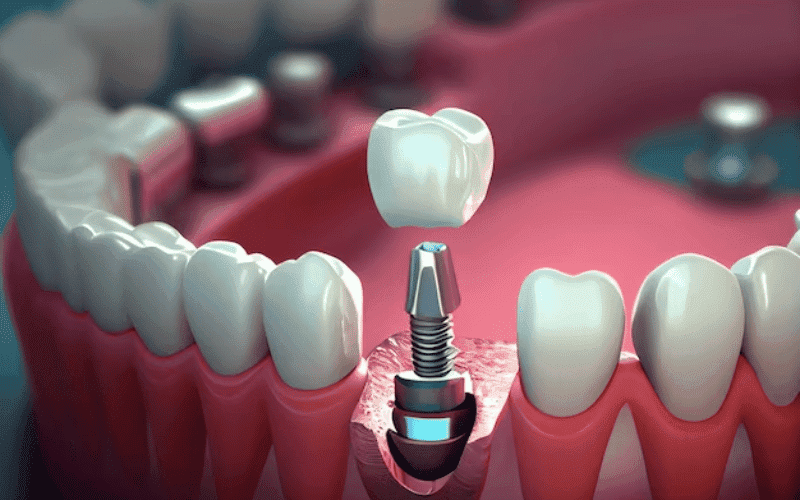Dental implants are titanium posts surgically inserted into the jawbone to replace missing teeth, offering sturdy support for crowns or bridges. They mimic natural teeth in function and appearance. Conversely, dentures are detachable prosthetic devices that substitute for lost teeth and surrounding tissue.
They come in partial or complete forms and rest on the gums. While implants provide a more permanent and natural-feeling solution, dentures offer versatility and affordability. Both options aim to restore oral functionality and aesthetics and improve overall dental health for individuals with missing teeth.
Pros and cons of dental implants
A. Pros of dental implants:
1. Durability: Implants are durable and can last a lifetime with proper care.
2. Natural feel and appearance: They look and function like natural teeth, providing a comfortable and aesthetic solution.
3. Bone preservation: Implants stimulate jawbone growth, preventing bone loss and maintaining facial structure.
4. Improved oral health: They don’t rely on neighboring teeth for support, preserving overall dental health.
5. Enhanced chewing ability: Implants restore full chewing function, allowing for a more varied diet and better digestion.
B. Cons of dental implants:
1. Cost: They can be expensive initially, although they offer long-term benefits.
2. Surgery: The implant placement involves a surgical procedure with associated risks.
3. Healing time: Osseointegration (fusion with the jawbone) takes several months, lengthening the treatment process.
4. Potential complications: Infection, nerve damage, or implant failure can occur, albeit infrequently.
5. Not suitable for everyone: Insufficient bone or certain health conditions may preclude some individuals from receiving implants.
Pros and cons of dentures
A. Pros of dentures:
1. Affordability: Dentures are typically more cost-effective than implants, making them a more accessible option for many.
2. Non-invasive: No surgery is required for denture placement, reducing the risks associated with invasive procedures.
3. Versatility: They can replace multiple missing teeth, whether partial or complete, offering flexibility in treatment options.
4. Faster solution: Dentures can be fabricated and fitted relatively quickly compared to implants, providing a quicker teeth replacement solution.
5. Adjustability: Dentures can be adjusted or replaced as needed, providing adaptability to changes in oral health or jawbone structure.
B. Cons of dentures:
1. Maintenance: Regular cleaning and care are essential to prevent plaque buildup, bad breath, and potential infections.
2. Reduced chewing efficiency: Unlike implants, dentures might not offer the same chewing capability, limiting food choices.
3. Potential discomfort: Initially, dentures might cause soreness or difficulty in speech until the mouth adjusts to them.
4. Stability issues: Dentures can become loose or shift, affecting confidence and requiring adhesive use for stability.
5. Bone resorption: Over time, wearing dentures can lead to bone loss in the jaw, altering facial structure and fit.
Cost comparison between Dental Implants and Dentures
The cost of dental implants versus dentures can vary significantly based on several factors, including the type of implant or denture, additional procedures needed, location, and the dentist’s fees. However, there’s a general cost comparison:
A. Dental Implants:
– Single-tooth implant: The cost per implant can range from $1,000 to $3,000.
– Full mouth implants (for replacing multiple teeth): Total costs can vary widely, typically from $3,000 to $30,000 or more, depending on the number of implants required.
– Additional procedures like bone grafts or sinus lifts can increase the cost.
B. Dentures:
– Partial dentures: The cost ranges from $300 to $5,000 depending on materials and complexity.
– Full dentures: Prices vary between $600 to $10,000 for a complete set, considering material quality, fit, and customization.
– Additional costs might include adjustments, relining, or replacements over time.
Factors affecting costs:
1. Implant materials (titanium or zirconia) and denture materials (acrylic, metal, porcelain) impact prices.
2. Customization, additional procedures (like extractions), and the need for bone grafting influence costs for both implants and dentures.
3. Dentist expertise and location (urban versus rural areas) can affect pricing.
While dental implants often have a higher upfront cost compared to dentures, they offer long-term benefits in terms of durability, aesthetics, and oral health. While initially more affordable, dentistry may require frequent maintenance and replacements, potentially incurring long-term costs.
It’s crucial to consult a dentist to understand specific treatment needs and associated costs before deciding. Dental insurance coverage and financing options can also impact the overall expense for implants and dentures.
Maintenance and care for dental implants vs dentures
Maintenance and care for dental implants and dentures differ due to their distinct structures and attachment methods:
A. Dental Implants:
1. Oral Hygiene: Brushing and flossing around implants, like natural teeth, is crucial to prevent plaque buildup and gum disease.
2. Regular Dental Visits: Routine check-ups with a dentist ensure the implants’ health and the surrounding gum tissue.
3. Avoidance of Damaging Habits: Prevent habits like teeth grinding or chewing on complex objects that can stress the implants.
4. Implant-Specific Products: Some dentists recommend specialized brushes or oral rinses for implants to maintain cleanliness.
B. Dentures:
1. Daily Cleaning: Remove and brush dentures daily using a denture brush and mild cleanser to remove food particles and plaque.
2. Overnight Soaking: Soak dentures in a denture cleaning solution or water overnight to maintain their shape and cleanliness.
3. Oral Hygiene: Brush the gums, tongue, and palate to stimulate circulation and keep the mouth clean.
4. Denture Adhesives: When necessary, use denture adhesives to enhance stability, but avoid overusing as it can affect fit.
Both require attention to oral health, but implants resemble natural teeth more closely, requiring similar care practices. Dentures need regular cleaning and soaking to prevent bacterial buildup and maintain fit.
Dental implants offer a more seamless experience but necessitate proper oral hygiene for long-term success. At the same time, dentures demand meticulous daily care and occasional adjustments for optimal function and comfort. Consulting a dentist for personalized care instructions is essential for effectively maintaining dental implants and dentures.
Success rates of dental implants and dentures
The success rates of dental implants and dentures can vary based on various factors, including the patient’s overall health, oral hygiene, bone density, the skill of the dentist or oral surgeon, and maintenance routines. Here are approximate success rates:
A. Dental Implants:
– Success rates for dental implants are generally high, ranging from 95% to 98% over ten years, according to numerous studies. Implants can last a lifetime if they are correctly positioned and maintained.
– Factors influencing success include osseointegration (fusion with the jawbone), which may be affected by bone quality, implant location, and the patient’s oral health.
– Implants may fail due to infection, poor bone integration, or other complications, but these are rare.
B. Dentures:
– Success rates for dentures vary more widely, typically from 50% to 70% over five years.
– Properly fitted dentures and good oral hygiene habits contribute to their success.
– Dentures might need adjustments or replacements due to changes in bone structure, wear and tear, or shifting over time.
Overall, dental implants tend to have higher success rates compared to dentures. However, success rates can fluctuate based on individual circumstances. Regular dental visits, good oral hygiene, and following the dentist’s recommendations can significantly impact the success and longevity of dental implants and dentures.
Consulting a dental professional for personalized care and guidance is essential for optimal outcomes.
Deciding Factors
1. Oral Health and Bone Structure: Consider the health of your gums and jawbone. Dental implants require sufficient bone density for successful placement, while dentures might be more suitable if bone density is insufficient.
2. Longevity and Durability: Evaluate the long-term outlook. Dental implants offer excellent durability and can last a lifetime with proper care, while dentures might require periodic adjustments or replacements over time.
Also Read: How Long Do Dental Implants Last?
3. Cost and Affordability: Assess your budget and dental insurance coverage. Dental implants typically cost more upfront than dentures, although they offer long-term benefits that might justify the initial investment.
4. Lifestyle and Comfort: Consider your lifestyle and preferences. Dental implants feel more natural and stable, allowing for better chewing and speaking, while dentures might require adjustments and adaptation.
5. Maintenance and Care: Reflect on your willingness and ability to maintain oral hygiene. Dental implants mimic natural teeth, needing similar care, while dentures require regular cleaning and care routines to prevent issues like plaque buildup and gum irritation.
Conclusion: Which option is better for you?
When choosing between dental implants and dentures, the decision hinges on various factors. Assessing your oral health, bone structure, long-term expectations, budget, lifestyle, and maintenance preferences is crucial.
DNA Dental Studio Burbank offers personalized guidance to help you make an informed choice.
Dental implants may be preferred for those seeking a durable, natural-feeling solution with higher upfront costs but long-term benefits. However, dentures could be a viable alternative if affordability or bone density concerns are prominent.
Schedule a consultation at DNA Dental Studio Burbank today to determine the best solution.
Their expert team will assess your situation, discuss options, and provide tailored recommendations, ensuring your satisfaction and oral health.
Schedule your consultation at DNA Dental Studio Burbank now to explore the ideal dental solution tailored for you and regain your confident smile.


